Murad Ali Shah: Our province’s money is being used to pay off loans
Sindh Chief Minister Murad Ali Shah has voiced concerns over the allocation of provincial funds, claiming that Sindh’s resources are being diverted to repay national debts.
Speaking at a joint press conference in Karachi alongside Federal Minister for Planning and Development Ahsan Iqbal, he emphasized the need for collaboration between the public and private sectors to better serve the people.
Meanwhile, Ahsan Iqbal highlighted the urgency of focusing on economic stability rather than political disruptions, stating that Pakistan requires an “economic long march” rather than a political one.
Sindh CM’s stance
Murad Ali Shah underlined the importance of controlling rapid population growth and ensuring the timely completion of development projects. He announced that Bhutto Road would be completed by the end of the year.
Also, read this
Sindh increases age limit for government job applicants
In letter to PM, Sindh CM protests federal injustice over motorway projects
Ahsan Iqbal: Imran Khan embezzled Rs64 billion from the poor
He stressed the need for digital advancements and economic zones, citing the Dhabeji Economic Zone as a key initiative. He also pointed out Pakistan’s financial struggles with imports, emphasizing the need for strategic planning to boost progress. Addressing technological advancements, he admitted that modern technology is best handled by the younger generation and emphasised the untapped talent in rural Sindh.
He called for equal distribution of resources in line with constitutional provisions.
The CM also referenced environmental concerns, recalling that climate change was included in their 2008 manifesto.
He noted that the devastating floods reinforced the urgency of water conservation efforts.
Sindh, he said, has initiated an expensive water-lining project and urged the federal government to invest in similar ventures.
On energy development, he highlighted Sindh’s vast potential beyond Thar coal, citing the 50,000MW capacity of the Jhimpir Corridor.
However, he lamented that progress has been slow. He also warned that Pakistan’s growing youth population could become a disadvantage if educational challenges are not addressed.
Murad Ali Shah concluded by thanking Ahsan Iqbal for his visit and remarks, reaffirming Sindh’s commitment to national progress.
He reiterated the importance of provincial-federal collaboration to achieve sustainable development by 2029, with a target of growing Pakistan’s economy to $3 trillion by 2030.
Ahsan Iqbal calls for unity
Ahsan Iqbal echoed the need for unity, emphasising that Pakistan’s success depends on collective efforts rather than political unrest.
He pointed to positive economic indicators, including rising exports, a record-breaking stock market, and decreasing policy rates.
He acknowledged Sindh’s role in national development, noting that the province houses Pakistan’s largest port and plays a crucial role in increasing exports.
He emphasised the government’s commitment to securing affordable energy and collaborating with Sindh for future progress.
Iqbal also highlighted climate change as a major concern, referencing the devastating floods and stressing the importance of addressing environmental challenges.
He positioned Thar as Pakistan’s emerging energy hub and underlined the need to manage population growth efficiently.
He concluded by reaffirming the government’s commitment to working with all provinces to achieve long-term economic goals.
For the latest news, follow us on Twitter @Aaj_Urdu. We are also on Facebook, Instagram and YouTube.








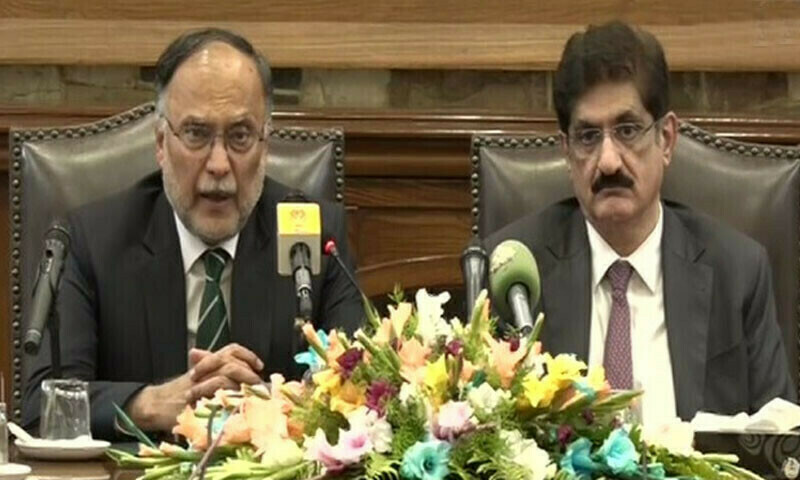






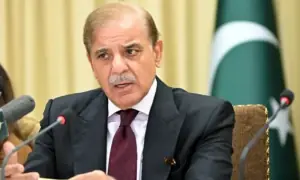
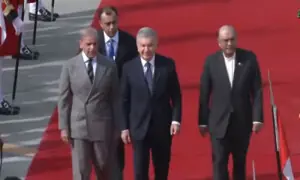



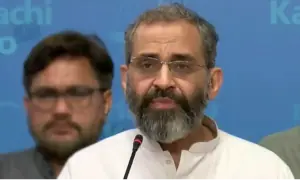
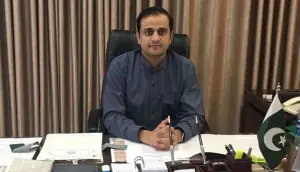
Comments are closed on this story.